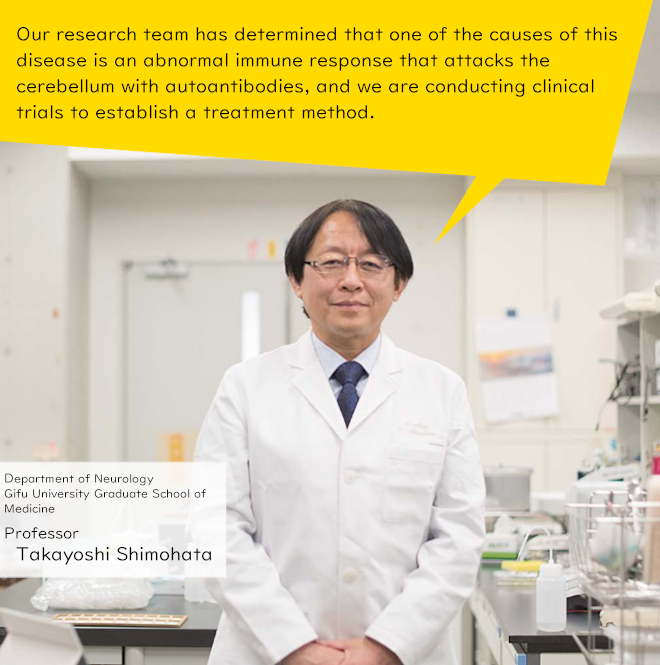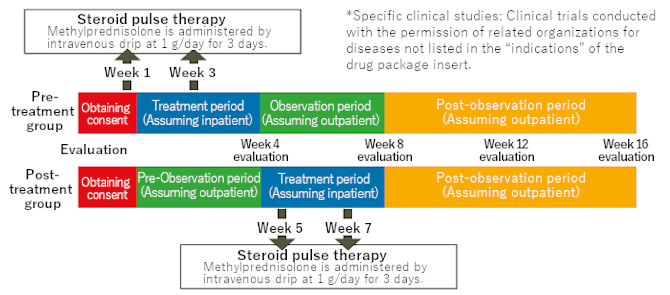Clarifying the involvement of autoantibodies in the intractable disease idiopathic cerebellar ataxia.Clinical trials are underway to establish a treatment.
*Information related to faculty members/students and graduate schools at Gifu University here are all that of the time of interviewing.

Intractable neurological disease of unknown cause.The key to suppressing symptoms is "bad antibodies."
Meeting a patient with amyotrophic lateral sclerosis (ALS) when I was an intern prompted me to join the Department of Neurology.
Eventually, while performing medical treatments at a city hospital, I looked after a young female patient with severe dentatorubro-pallidoluysian atrophy (DRPLA).
Her condition continued to worsen without any means to stop the frequent and severe seizures. She died a few months after I left. DRPLA is a disease classified as spinocerebellar degeneration among neurodegenerative diseases.After this experience, my determination to study spinocerebellar degeneration for the rest of my life remains unchanged to the present.
Idiopathic cerebellar ataxia is a type of spinocerebellar degeneration characterized by a malfunctioning cerebellum, and it presents with symptoms such as unsteady gait and speech impairment.It is an intractable disease that progresses gradually, with no effective treatment available.
I moved to Gifu University in 2017 and started research on this disease with a team comprised of Associate Professor Akio Kimura, Lecturer Nobuaki Yoshikura, and Assistant Professor Akira Takekoshi - all of whom are from the Department of Neurology.
We propose "Autoantibodies (Fig. 1)", an abnormal immune response that attacks the cerebellum with autoantibodies.
An abnormal antibody not found in healthy subjects was detected in the blood of patients with idiopathic cerebellar ataxia.
We asked ourselves, "Could there be a cause for the patterns in the patients with abnormal antibodies?"
There are two types of antibodies in the body: "good antibodies" that contribute to your immunity and "bad antibodies" that attack your own cells.
I thought that the bad antibodies/autoantibodies might be damaging the nerve cells in the cerebellum.
My specialty is degenerative diseases*1, but the other members specialize in neuroimmunology*2.
As a result of the research from these viewpoints, we detected an abnormal antibody in the blood of patients, the "anti-mGluR1 antibody," which is not found in healthy subjects.
Based on this result, we are conducting physician-led clinical trials*3 using drugs that are effective in suppressing bad antibodies.
Methylprednisolone has already been used to treat asthma and other immune disorders.
It does not require new approval. Therefore, if it can be proven to be effective in clinical trials, it will become available in a short period of time.
In the process of this research, we were able to establish an antibody measurement system.
The detection and measurement of specific antibodies involved in the disease in the blood and cerebrospinal fluid of patients with suspected spinocerebellar degeneration is useful for diagnosis, and consultations are received from all over the country.
We are proud that the fusion of different fields has given rise to new ideas and that our group has become a leader in the research on antibody-related neurological diseases.
- *1 Degenerative disease A disease that develops when nerve cells with specific functions, such as motor function and cognitive function, are damaged and drop out.
- *2 Neuroimmunology The field of medicine that approaches neurological diseases from their relationship with the immune system.
- *3 Physician-led clinical trial A clinical trial led by a physician and not a drug manufacturer.
The idiopathic cerebellar ataxia research team is composed of neurologists at Gifu University

Lecturer
Nobuaki Yoshikura
(Chief Physician of the ward)

Associate Professo
Akio Kimura
(Medical Office Manager)

Assistant Professor
Akira Takekoshi
I want to share the knowledge in my field of expertise, find out the cause of diseases through basic research, and discover methods directly linked to the treatment of patients.
The people in the research team have one goal in mind: to "make something that is clinically useful."

Traditionally, there has been a large gap between "basic research" that reveals the mechanism of the disease and "clinical research" that finds ways to eliminate the cause or slow down the progression of the disease based on the results.
There is still a long way to go before the results of basic research are useful to patients.
The current research team is a group of physicians who aim to help patients while valuing basic research, even though we are small in number.
We are working to ensure that we can produce results that we can disseminate from Gifu to the world.
Other research themes include "COVID-19 encephalopathy," in which we examine aphasia caused by SARS-CoV-2, and the "burnout" problem among physicians, which has become an issue in recent years. The team is also focusing on training specialists.
With the aging of the population, diseases such as dementia and Parkinson's disease are becoming more frequent, and the needs for neurology are increasing; however, manpower is insufficient.
However, we are making efforts to broaden the base of treatment by cooperating with other departments.
The Department of Neurology, which has been treating patients for a long period of time, is a challenging clinical department.
I hope that young doctors and medical students will join us.
An abnormal antibody not found in healthy subjects was detected in the blood of patients with idiopathic cerebellar ataxia.

Pattern in healthy people

Pattern in patients with abnormal antibodies
We conducted specific clinical studies on patients with "idiopathic cerebellar ataxia" among "spinocerebellar degeneration." In a general clinical trial, the study drug is administered to only one of two groups. However, in this trial, the drug is administered to all subjects from an ethical point of view so as not to impair the interests of the subject-patients. The effect of the drug will be verified by observing one group before administration and the other after administration. (Clinical trials are recruited until November 2022)






